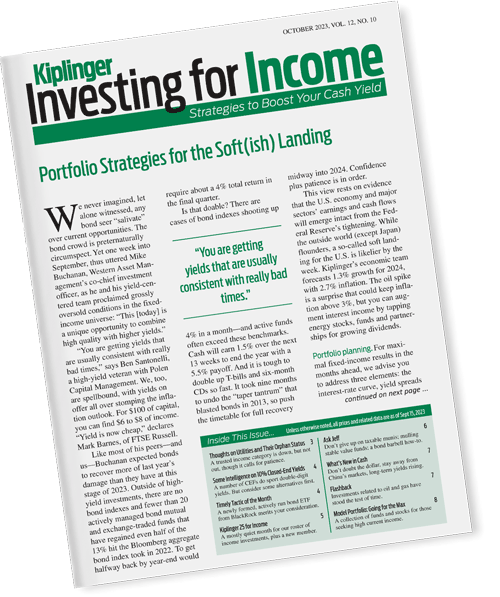The 13 Best Things Rich Retirees Do
From prioritizing spending and investing to using debt wisely, rich retirees get it right. Ready to build a roadmap for your meaningful journey?


Profit and prosper with the best of Kiplinger's advice on investing, taxes, retirement, personal finance and much more. Delivered daily. Enter your email in the box and click Sign Me Up.
You are now subscribed
Your newsletter sign-up was successful
Want to add more newsletters?

Delivered daily
Kiplinger Today
Profit and prosper with the best of Kiplinger's advice on investing, taxes, retirement, personal finance and much more delivered daily. Smart money moves start here.

Sent five days a week
Kiplinger A Step Ahead
Get practical help to make better financial decisions in your everyday life, from spending to savings on top deals.

Delivered daily
Kiplinger Closing Bell
Get today's biggest financial and investing headlines delivered to your inbox every day the U.S. stock market is open.

Sent twice a week
Kiplinger Adviser Intel
Financial pros across the country share best practices and fresh tactics to preserve and grow your wealth.

Delivered weekly
Kiplinger Tax Tips
Trim your federal and state tax bills with practical tax-planning and tax-cutting strategies.

Sent twice a week
Kiplinger Retirement Tips
Your twice-a-week guide to planning and enjoying a financially secure and richly rewarding retirement

Sent bimonthly.
Kiplinger Adviser Angle
Insights for advisers, wealth managers and other financial professionals.

Sent twice a week
Kiplinger Investing Weekly
Your twice-a-week roundup of promising stocks, funds, companies and industries you should consider, ones you should avoid, and why.

Sent weekly for six weeks
Kiplinger Invest for Retirement
Your step-by-step six-part series on how to invest for retirement, from devising a successful strategy to exactly which investments to choose.
If you're retired and rich, you've struck gold — unless you stumble or hit a rough patch. Perish the thought.
When planning for your future, you might have invested wisely, scaled the corporate ladder or chased entrepreneurial dreams and found success. No matter how you got here, there were undoubtedly many pieces (rather than just one) to the “habits of rich retirees” puzzle you put together. Props to you.
“Wealthy retirees who enjoy 'the good life' understand that maintaining their wealth while living comfortably requires both lifestyle and financial strategies,” says Melissa Murphy Pavone, founder at Mindful Financial Partners.
From just $107.88 $24.99 for Kiplinger Personal Finance
Become a smarter, better informed investor. Subscribe from just $107.88 $24.99, plus get up to 4 Special Issues

Sign up for Kiplinger’s Free Newsletters
Profit and prosper with the best of expert advice on investing, taxes, retirement, personal finance and more - straight to your e-mail.
Profit and prosper with the best of expert advice - straight to your e-mail.
Financial habits that rich retirees swear by
Being rich means different things to different people. To some retirees, it might mean hoarding all their hard-earned money in a high-interest savings or retirement account to use “just in case.” To others, it means spending it all. The sweet spot is probably somewhere in between.
In any case, if you've made intentional choices in the years before retirement and you find yourself clinging to a king's ransom, check out these 12 best things rich retirees do from both a financial and lifestyle perspective.
1. Rich retirees understand money vs wealth
According to Merriam-Webster, wealth is an abundance of valuable material possessions or resources. While true in one respect, wealth goes beyond the accumulation of money.
While wealth and money are often used interchangeably, money essentially refers to the assets you have on hand, such as cash, property and investments. It's tangible and is generally measured by taking the market value of all intangible and tangible assets you own and subtracting outstanding debts.
On the other hand, wealth is also a measure of an individual's overall abundance and prosperity, which includes knowledge, skills and relationships. While money contributes to wealth, it extends far beyond possessions and cash to include a sense of fulfillment and well-being in retirement.
After all, "No man is rich enough to buy back his past." — Oscar Wilde
2. Rich retirees spend with purpose
The book Die With Zero encourages people of all ages, including retirees, to spend their hard-earned cash while they still can. The book is intended for those who view lifelong experiences as more important than simply accumulating money for your golden years.
While taking exotic trips or buying the latest Ferrari F80 is a well-earned benefit of retirement for the rich, spending like there is no tomorrow can lead to unintended consequences.
It’s OK not to spend, but it’s also OK to enjoy your retirement years, which might include splurging occasionally. It’s not unheard of for many retirees to set aside money in a separate “fun money” account, which gives them “permission to spend.”

3. Rich retirees invest wisely
You might have heard the saying, “no risk, no reward.” While that might be true to a certain extent, many retirees are averse to risk. Savers who consistently (and wisely) invested their earnings compounded their money over time.
While the initial investment might have been insignificant, the wealth accumulated during the final years of a person's working life can be substantial, says Matt Hylland, a financial planner at Arnold and Mote Wealth Management.
Investing in a retirement account, like a 401(k), IRA, or mutual fund, or investing in the stock market, can build wealth and help secure a comfortable future.
Yet, investing in the stock market comes with a fear of financial loss. That’s a reasonable fear — until you realize that over the long term, the S&P 500 has returned an average of 10% annually.
Most experts agree that saving 20% of your income (while working) is a good starting place to build an emergency fund. In retirement, setting some extra cash aside in reserve for a couple of years of spending needs is also important. Any additional funds can be invested in stocks, bonds and other investable assets that continue building wealth.
"While it's always important to have some cash set aside, staying invested for growth, even in retirement, helps one's wealth continue to grow," says David Edmisten, CFP, founder and lead adviser at Pure Financial Advisors. "There is often no need to reduce risk in your portfolio if you have enough spending money set aside in a cash reserve." If you're not sure where to start, reach out to a financial adviser or stock expert for guidance.
Warren Buffett famously said, "I will tell you the secret to getting rich on Wall Street. You try to be greedy when others are fearful. And you try to be fearful when others are greedy."
4. Rich retirees diversify investments
Diversifying your investments is another way to balance risk and outcome. It involves spreading your investments around so that your exposure to any one type of asset is limited. Joe Cronin, president of International Citizens Insurance, says that most affluent retirees focus on diversifying their income stream by investing.
“Proper tax management is also critical, and wealthy retirees often work with advisers to optimize deductions, retirement withdrawals, and even international tax treaties, when applicable, to ensure they retain more of their wealth,” Cronin says.
Cronin also mentions that wealthy retirees still maintain keen budgeting habits, such as checking out the new 60/30/10 rule and tracking large expenses, which can guard against overspending. “Wealthy retirees' wise financial strategies and thoughtful lifestyle decisions enable them to ensure long-term stability and enjoyment.”
5. Rich retirees assemble a team of trusted professionals
It's common for rich retirees to gather a team of financial experts to help manage their estates.
“The best outcomes happen when a retiree's CFP®, CPA and estate-planning attorney work collaboratively. Together, they create a holistic strategy that adapts to life's changes, ensures tax efficiency and protects the retiree's legacy,” says Pavone.
That team might include a certified financial planner (CFP), a certified public accountant (CPA), an estate-planning attorney, or all three — each playing a vital role in safeguarding and optimizing wealth.
6. Rich retirees determine a safe withdrawal rate
The percentage that retirees can withdraw from their accounts each year without running out of money before reaching the end of their lives is called a safe withdrawal rate.
One guideline that some still follow today is the 4% rule — retirees withdraw 4% of their retirement savings in the first year, then adjust that amount for inflation each subsequent year. This allows their savings to last for about 30 years.
Your personal safe withdrawal rate is influenced by your legacy goals, and involves estate planning, setting up trusts, revising wills and determining how much money you’d like to leave to your children, family members or a charity. This directly impacts how much money you can withdraw each year from your nest egg while still maintaining a comfortable lifestyle.

7. Rich retirees monitor the tax code
It doesn’t matter how rich you are; taxes are inevitable.
However, rich retirees understand how to minimize the amount they pay to the IRS each year by taking advantage of tax breaks, such as credits and deductions. They also examine the newest tax laws to see how they can structure their finances to pay the least amount of tax while also following the law.
Monitoring the tax code and tax planning can significantly impact your finances. You’ll know how much you’ll owe in taxes and how much you can invest to generate even more income.
8. Rich retirees use debt wisely
Wealthy retirees understand how debt can create leverage by enabling them to borrow money at a low interest rate and invest in assets with the potential of a greater return over time.
Cronin maintains that through wise debt management, “retirees can focus on diversifying their income stream by investing in rental units, income-generating stocks and other passive income sources to ensure consistent cash flow to enable them to fund their lifestyles without depleting principal savings.”
Lifestyle habits rich retirees swear by
Maximizing investments and savings and assembling a team of financial professionals aren’t the only things rich retirees do. Although money definitely plays a big part in enjoying retirement, affluent retirees also acquire smart lifestyle habits that allow them the luxury of a long and happy life.
1. They live with purpose
Beyond finances, most wealthy retirees commit to living with purpose, now that they no longer work. Steven Kibbel, CFP, ChFC, CLU, at International Money Transfer says: “For many, retirement isn’t just about leisure — it’s about finding meaning.”
He goes on to explain that rich retirees often volunteer, donate to causes they care about or spend time mentoring younger generations. “Staying active is a priority, too, both physically and mentally. Picking up hobbies, traveling or even starting a small passion project helps them stay sharp and engaged.”
2. Yes, they sleep
In our fast-paced society, in which we're constantly racing from one task to the next, sleep is often the first thing to get sidelined — barely making the top 10 on our to-do lists. But a study published on Springer using data by PubMed, Cochrane Central and Web of Science found that imbalanced sleep increases mortality risk by 14% to 34%.
Sleep is vital to a healthy lifestyle later in life. It's “a necessary function that enables the body and mind to recharge.” Sleep can help stave off diseases, while lack of sleep can increase your risk of developing type 2 diabetes, heart problems and high blood pressure, according to the Medical Advisory Board at the Sleep Foundation.
After years of hard work, remaining healthy — and sleeping an average of seven hours each night — in retirement is one of the best things rich retirees do for themselves and their families.
3. They develop a giving attitude
Wealthy retirees often emulate a charitable mindset. Research suggests that giving to a cause or charity not only helps the recipient, but also rewards the giver in measurable ways, so much so that it might increase your life expectancy.
According to an article by Donors Trust, studies have shown that “people who engage in regular acts of kindness and generosity tend to have lower blood pressure, reduced risk of chronic diseases, better cardiovascular health and a stronger immune system.”
These benefits, among others, underscore why incorporating acts of kindness as a wealthy retiree can be a powerful source of good for you... and the world.
4. They find a balance between spending and enjoyment
Even with considerable wealth, retirees habitually maintain keen budgeting habits.
“Tracking large expenses, such as real estate, health care or expensive luxuries, can guard against overspending, Cronin adds. Many of the wealthiest retirees also practice the 50/30/20 budget rule: Spend 50% on needs, 30% on wants and put 20% toward savings.
It’s also common for frugality to become a principal financial habit. Gene Caballero, co-founder at Green Pal, says that as a retired entrepreneur who travels six months out of the year, his only lifestyle choice that he continues to uphold is flying coach.
“Flying coach instead of first class has saved me over $40K this year alone. I see no need to splurge for first class and pay three- or four-times the price when we all go to the same place. I can spoil myself on food and drinks when I arrive at my destination instead.”
But some stumble, and the balance between spending and saving becomes blurred. Mike Tyson had no money in the bank at retirement, and both Dorothy Hamill and Dennis Rodman wound up going broke after earning millions.

5. They value money and happiness
For many wealthy retirees, being rich means placing as much value on happiness as they do on the amount of money they have, according to the Charles Schwab Modern Wealth 2025 Survey (PDF). It's the financial freedom to enjoy retirement without the burden of excessive debt, which can ensure financial stability, peace of mind and a healthy lifestyle.
"It’s good to have money and the things that money can buy, but it’s good, too, to check up once in a while and make sure that you haven’t lost the things that money can’t buy." —n George Lorimer
Building a dream retirement shouldn’t feel like a second job. Subscribe to our free newsletter, Retirement Tips.
Related Content
- To Retire Rich, Stop Chasing Huge Returns and Do This Instead, Courtesy of a Financial Planner
- Retirement Calculator: How Much Do I Need to Retire?
- Risk in Retirement: What's the Right Level for You?
- How to Keep Lifestyle Creep From Hurting Your Wealth
- The Three C's to Financial Success: A Financial Planner's Guide to Build Wealth
Profit and prosper with the best of Kiplinger's advice on investing, taxes, retirement, personal finance and much more. Delivered daily. Enter your email in the box and click Sign Me Up.

For the past 18+ years, Kathryn has highlighted the humanity in personal finance by shaping stories that identify the opportunities and obstacles in managing a person's finances. All the same, she’ll jump on other equally important topics if needed. Kathryn graduated with a degree in Journalism and lives in Duluth, Minnesota. She joined Kiplinger in 2023 as a contributor.
-
 Dow Adds 1,206 Points to Top 50,000: Stock Market Today
Dow Adds 1,206 Points to Top 50,000: Stock Market TodayThe S&P 500 and Nasdaq also had strong finishes to a volatile week, with beaten-down tech stocks outperforming.
-
 Ask the Tax Editor: Federal Income Tax Deductions
Ask the Tax Editor: Federal Income Tax DeductionsAsk the Editor In this week's Ask the Editor Q&A, Joy Taylor answers questions on federal income tax deductions
-
 States With No-Fault Car Insurance Laws (and How No-Fault Car Insurance Works)
States With No-Fault Car Insurance Laws (and How No-Fault Car Insurance Works)A breakdown of the confusing rules around no-fault car insurance in every state where it exists.
-
 Why Picking a Retirement Age Feels Impossible (and How to Finally Decide)
Why Picking a Retirement Age Feels Impossible (and How to Finally Decide)Struggling with picking a date? Experts explain how to get out of your head and retire on your own terms.
-
 For the 2% Club, the Guardrails Approach and the 4% Rule Do Not Work: Here's What Works Instead
For the 2% Club, the Guardrails Approach and the 4% Rule Do Not Work: Here's What Works InsteadFor retirees with a pension, traditional withdrawal rules could be too restrictive. You need a tailored income plan that is much more flexible and realistic.
-
 Retiring Next Year? Now Is the Time to Start Designing What Your Retirement Will Look Like
Retiring Next Year? Now Is the Time to Start Designing What Your Retirement Will Look LikeThis is when you should be shifting your focus from growing your portfolio to designing an income and tax strategy that aligns your resources with your purpose.
-
 I'm a Financial Planner: This Layered Approach for Your Retirement Money Can Help Lower Your Stress
I'm a Financial Planner: This Layered Approach for Your Retirement Money Can Help Lower Your StressTo be confident about retirement, consider building a safety net by dividing assets into distinct layers and establishing a regular review process. Here's how.
-
 Your Adult Kids Are Doing Fine. Is It Time To Spend Some of Their Inheritance?
Your Adult Kids Are Doing Fine. Is It Time To Spend Some of Their Inheritance?If your kids are successful, do they need an inheritance? Ask yourself these four questions before passing down another dollar.
-
 The 4 Estate Planning Documents Every High-Net-Worth Family Needs (Not Just a Will)
The 4 Estate Planning Documents Every High-Net-Worth Family Needs (Not Just a Will)The key to successful estate planning for HNW families isn't just drafting these four documents, but ensuring they're current and immediately accessible.
-
 Love and Legacy: What Couples Rarely Talk About (But Should)
Love and Legacy: What Couples Rarely Talk About (But Should)Couples who talk openly about finances, including estate planning, are more likely to head into retirement joyfully. How can you get the conversation going?
-
 We're 62 With $1.4 Million. I Want to Sell Our Beach House to Retire Now, But My Wife Wants to Keep It and Work Until 70.
We're 62 With $1.4 Million. I Want to Sell Our Beach House to Retire Now, But My Wife Wants to Keep It and Work Until 70.I want to sell the $610K vacation home and retire now, but my wife envisions a beach retirement in 8 years. We asked financial advisers to weigh in.